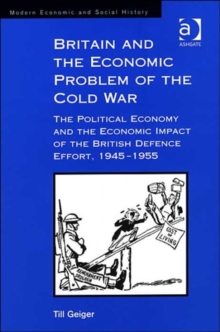
Britain and the Economic Problem of the Cold War : The Political Economy and the Economic Impact of the British Defence Effort, 1945-1955 PDF
by Till Geiger
Part of the Modern Economic and Social History series
Description
Many accounts of British development since 1945 have attempted to discover why Britain experienced slower rates of economic growth than other Western European countries. In many cases, the explanation for this phenomenon has been attributed to the high level of defence spending that successive British post-war governments adhered to. Yet is it fair to assume that Britain's relative economic decline could have been prevented if policy makers had not spent so much on defence? Examining aspects of the political economy and economic impact of British defence expenditure in the period of the first cold war (1945-1955), this book challenges these widespread assumptions, looking in detail at the link between defence spending and economic decline. In contrast to earlier studies, Till Geiger not only analyses the British effort within the framework of Anglo-American relations, but also places it within the wider context of European integration. By reconsidering the previously accepted explanation of the economic impact of the British defence effort during the immediate post-war period, this book convincingly suggests that British foreign policy-makers retained a large defence budget to offset a sense of increased national vulnerability, brought about by a reduction in Britain's economic strength due to her war effort. Furthermore, it is shown that although this level of military spending may have slightly hampered post-war recovery, it was not in itself responsible for the decline of the British economy.
Information
-
Download - Immediately Available
- Format:PDF
- Pages:372 pages
- Publisher:Taylor and Francis
- Publication Date:05/07/2017
- Category:
- ISBN:9781351954778
Other Formats
- Hardback from £130.00
- EPUB from £34.82
- Paperback / softback from £42.35
Information
-
Download - Immediately Available
- Format:PDF
- Pages:372 pages
- Publisher:Taylor and Francis
- Publication Date:05/07/2017
- Category:
- ISBN:9781351954778










